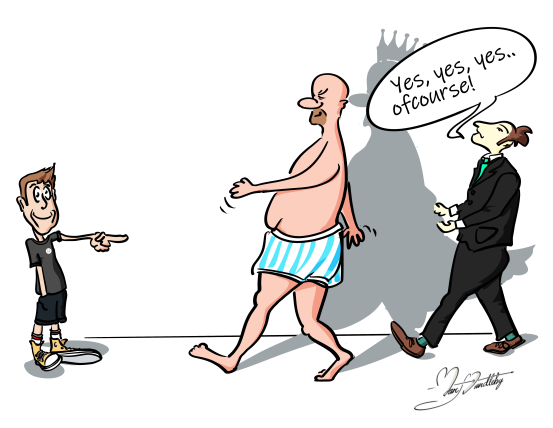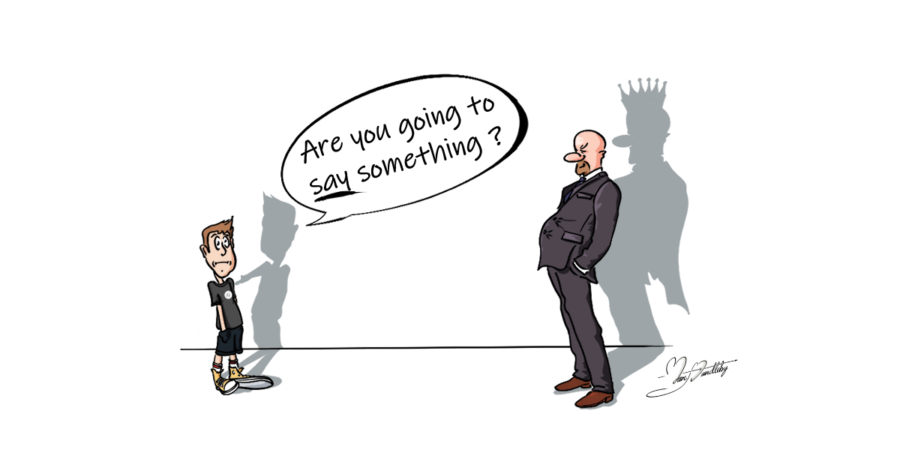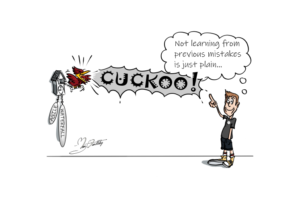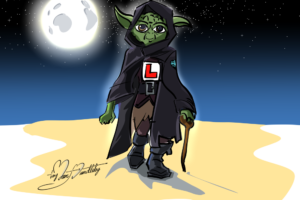Evolutionary Leadership Lessons – A Child’s Tale
In 1837 Hans Christian Andersen’s tale The Emperor’s New Clothes (let us refer to it as ENC for short) was first published for children. However, the learnings are still relevant for leaders, senior executives, and board members today.
It is not just within organisations; it doesn’t take much imagination for us to identify the names of a few politicians globally who were/are showing up “sans vêtements.” Ok, so let me be clear, I am not talking about a manager or leader showing up completely naked however I am talking about leaders being blind to reality.
Why is it still relevant?
Have we not grown over the last 184 years? Why are there environments and cultures in today’s organisations where the Emperor seems to show up time and time again?
Before we try to answer these questions, let us go back and refresh our memories of the famous tale.
ENC – Hyper condensed version
The tale is about two weavers who promise a vain emperor a new suit of clothes made from a particular golden thread they say is invisible only to those who are unfit for their positions, stupid, or incompetent.
The dishonest weavers swindle the Emperor out of gold, make no clothes, and con the Emperor, his courtiers, and ministers into “believing” that the clothes are invisible to them.
Not one of them speaks up.
When the emperor parades before the crowd in his new “clothes”, his courtiers, ministers and subjects are too scared to say they don’t see any clothes on him for fear that they will also appear stupid. Yet, he is naked!
Finally, a child cries out, “But he isn’t wearing anything at all!”
What is so fascinating about this tale?
It is much more than a simple story that momentarily taps into your imagination, quickly forgotten until you eventually have children and share it with them.
The metaphors in the tale provoke thought and provide insights into the human condition and subconscious behaviours.
Here lies the answer to some of those previous questions and why it appears that we are not evolving; we are dealing with things in our subconscious.
As a result, we may not be aware of our behaviours and how they impact those around us.
Let’s play catch up
How can we expect to adapt to the demands of today if we are yet to learn simple lessons from 184 years ago?
Many people talk and write about new ways of working, business agility, agile mindset, all of which are required to survive and thrive in today’s VUCA World (Volatile, Uncertain, Complex, and Ambiguous).
Organisations are restructuring themselves to adapt to new ways of working to better align with the challenges of the modern environment. However, the structure alone is not enough. What is also required is a step-change or leap in self-awareness or consciousness. To gain higher levels of awareness, leaders need an upgrade.
For governments, they are outdated, cumbersome and largely ineffective and require a considerable rethink, an injection of innovation in addition to a leadership consciousness upgrade.
Unfortunately, there is no quick fix or pill that we can take to kick us into this new modality. Instead, it requires openness, deep, continuous work and patience.
The excellent news is that while this is taking place, there are some lessons and simple, practical steps that can make a massive difference to the workplace.
What to look out for – The warning signs
-
- Employees regularly talk about problems and the reality of the workplace, but don’t feel comfortable raising them with management
- Leaders join a company and immediately replace the original leadership team with direct reports from their previous organisation.
- People say things like, “Oh yeah, we’ve known about that for ages, but nobody in management seems to listen or care.”
It can happen quickly or over a long period, bubbling away under the surface subtle and unnoticeable at first until one day suddenly and unexpectedly creating a shock wave throughout the organisation.
A time to reflect
You may think that you are paying attention to what is going on in your organisation; however, let me present some statements for reflection:
-
- You aren’t aware of your behaviours and their impact on the people around you, positive or negative.
- You are too busy to spend time getting direct, honest feedback on your leadership and areas where you may be able to improve.
- “I’m way too uncomfortable to ask people for behavioural feedback!“
- “Who me, I’m perfect!” Yeah, right!
If you were honest with yourself and took the time to reflect on the above, then you may have experienced a slight discomfort somewhere in your body. Listen to this; it’s a valuable clue and ultimately a wonderful gift to you.
Some resources to help you to raise your awareness:
Book – Leading Beyond Change by Michael and Audree Tara Sahota
Training – Certified Agile Leadership – Scrum Alliance

184-year-old lessons
The ENC contains many lessons. I will endeavour to summarise a few that are relevant for leaders and the environments they need to foster to succeed today:
Lesson 1
The innocent little boy is free from social conventions. Leaders need to create a safe environment and encourage the more junior or free-thinking individuals to speak up first. We can shed the anchors of bias and enable the truth or best ideas to emerge if we do this. Even if these insights are proven wrong, it is ok; it’s not about being right or wrong. It’s about exploring the full range of possibilities that is important.
Lesson 2
The Emperor has surrounded himself with obsequious “advisors” or “yes people”. If we surround ourselves with people who are unwilling to tell us the truth, our detachment from reality grows. Leaders need to surround themselves with emotionally intelligent people and listen to the ideas and viewpoints of a range of individuals representing different parts of the organisation, not just their direct reports.
Lesson 3
The Emperor’s pride prevents him from admitting that he cannot see the clothes. Our pride can make us blind. The more pride we have, the harder it becomes to admit when we are wrong. Leaders need self-awareness and know their limitations. It is ok as a leader not to have an answer for everything, be vulnerable and ask your employees for help.
Lesson 4
The crowd represents the limitations and foolishness of wanting to conform to the majority. It allows a lie to take shape and become a “reality”, limiting creativity and innovation. Leaders need to create safe environments for new ideas to emerge.
Lesson 5
The fake weavers pretend to be experts. These artificial experts are perceived to be better than everyone else; therefore, they must be right. How often does an organisation listen to an expert, a highly paid external consultant and then blindly implement something incorrect or even damaging for your environment? Be open to hearing the ideas and opinions of employees. Pair a consultant with an employee to come up with the best solution(s). Don’t hide from the truth if the findings point to leadership growth opportunities.
The Emperor is still out there, please make sure it isn’t you
The characters and behaviours still exist in our workplaces today. We may recognise them; we may talk or even joke about them with our colleagues; however, rarely would we feel safe enough to approach a leader with these insights.
Even if we dared to speak up, and no matter how kind and helpful our intent, rarely would we be thanked for the gift of our insight by the leader. If we did have the courage to speak up, would the leader hear and see the truth? How would they react?
Everybody has different levels of consciousness and self-awareness. Unfortunately, for as long as we avoid the initial pain of looking deep into ourselves, there will be zero to little personal growth, and the lessons in the Emperor’s New Clothes will still be waiting for our leaders of the future.
The fabulous news is that the pain of internal growth and discovery is only temporary, and the upside is significantly higher.
Find out about My Evolutionary Journey
The Humble PM represents the little boy in the children’s tale, using visualisation, vulnerability and openness to inspire you to speak up in your organisation. I’d love to hear from you if the Emperor is still hanging around in your organisation.




